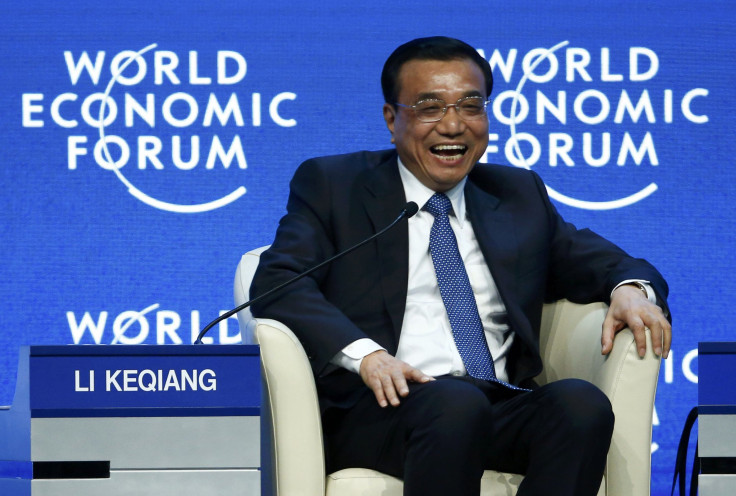Chinese Premier Li Keqiang Says China's Slowing Economic Growth Will Not Hurt Global Commerce

DAVOS, Switzerland -- China's Premier Li Keqiang sought to reassure a jittery international community that a gradual economic slowdown in the world's most-populous nation does not bode trouble for the rest of the global economy.
In the course of a keynote address here in this Swiss ski resort at the World Economic Forum on Wednesday evening, the Chinese premier acknowledged that the world has ample reason for concern -- not just because of sluggish economic growth but also because of grave concerns about security.
"The world today is anything but trouble-free," Li said, citing "regional hotspots, local conflicts and terrorist attacks. These challenges have emerged one after another, and they pose an immediate threat to humanity."
He added to the list "a global economic recovery that lacks speed and momentum." He named no names, but he surely was referring to Japan and Europe, where persistently listless growth and deepening fears of deflation -- falling prices, which discourages spending and investment -- have many world leaders on alert.
Concerns have also focused on China where Li, President Xi Jinping and other senior officials have publicly stressed their intention to swap some of China's breakneck growth for what they portray as higher-quality development. Such development would foster an economy that adds jobs while seeking to distribute the spoils more evenly and proceeds without intensifying the pollution that now cloaks many Chinese cities in a noxious haze.
Yes, the premier said, a gradual slowdown is indeed the plan, indulging the catchphrase that has come to describe this new mode of growth -- China's New Normal. But despite the lengthy list of legitimate worries, Li emphatically urged world leaders to scratch off the prospect of spillover effects from a slowing China.
"Some may even worry that they might be affected by China's economic slowdown and that China's economic situation might cause a potential impact," Li said.
He endeavored to "ease these concerns."
Even as China engineered a slowdown last year, its economy still grew at 7.4 percent during the course of 2014, according to government data. And even if China were to slow to 7 percent growth this year, that would still add some $800 billion in economic activity to global commerce -- which is more, the premier said, "than 10 percent growth five years ago."
Most of Li's speech was devoted to serving up a litany of long-pursued, long-emerging market reforms while offering assurances that more difficult economic times will not be an occasion for backsliding. China will go full speed ahead with liberalizing interest rates, allowing markets to play a greater role in setting prices, in forging trade agreements and opening up its financial system, he said.
"We will not be afraid of difficulties, and we will continue to move along the path of reform and restructuring," he said.
All of this, he suggested, was not only in China's interests but also that of the global economy.
"China’s reform and development will bring more opportunities for the world," he said.
Given China's stature -- it is the second-largest economy on earth -- anxiety about its slowdown has been felt broadly. In Argentina and Brazil, soy farmers fret about lost sales if China's hog farmers slow orders for livestock feed. In Australia, iron ore mines that have fed steel smelters in China have had to limit their own production. As oil services companies brace for limited demand for their offerings, this in part reflects diminishing demand for oil and other natural resources in China.
But in his speech Premier Li sought to cast China's slowdown as a kind of global project, one that will ultimately make China more vibrant and stable as its mode of economic development becomes less reliant on unbridled development and exports.
No official Chinese speech comes without a metaphor. Li did not disappoint, likening China's economy to a train.
"This train will not lose speed or momentum," he said. "On the contrary, it will only be powered by greater dynamism."
© Copyright IBTimes 2025. All rights reserved.





















